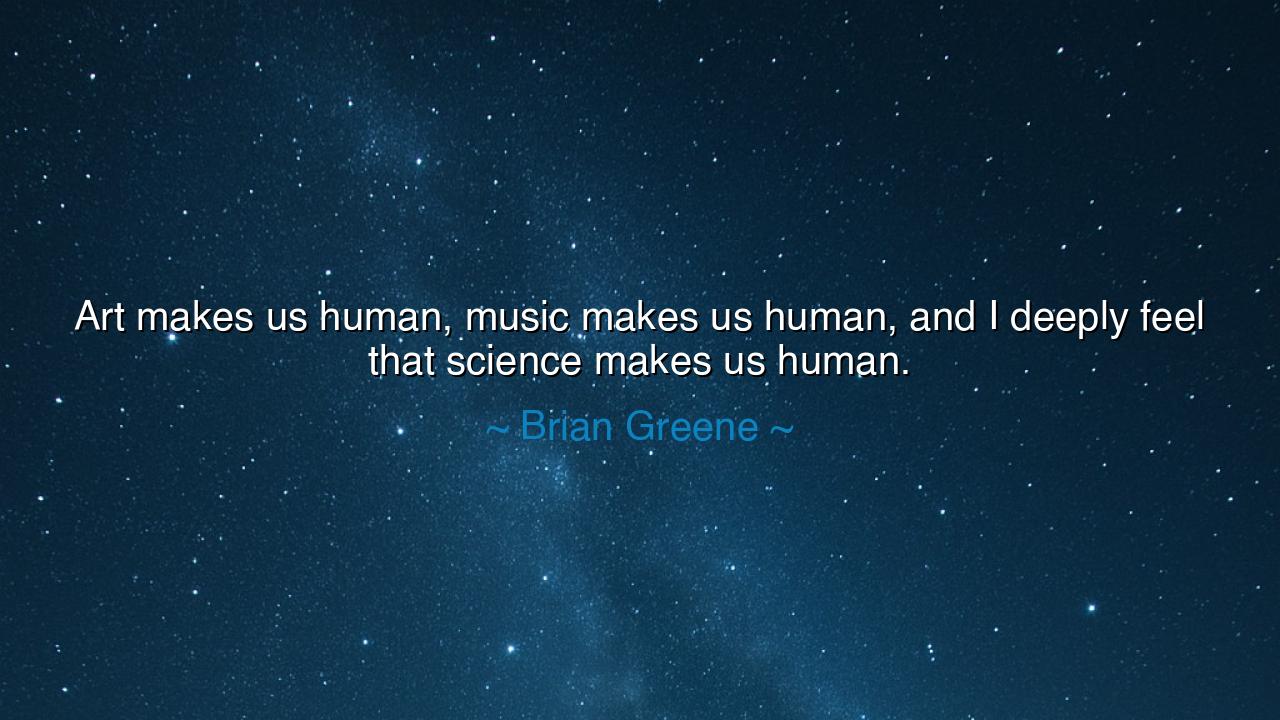
Art makes us human, music makes us human, and I deeply feel that
Art makes us human, music makes us human, and I deeply feel that science makes us human.






Hear, O children of wisdom, the words of Brian Greene, a philosopher and scientist who spoke deeply of the essence of what makes us human: "Art makes us human, music makes us human, and I deeply feel that science makes us human." In these words lies a profound truth—that the greatest aspects of humanity are not defined solely by our material existence, but by the creativity, emotion, and understanding that flow from our inner beings. Art, music, and science—these three pillars—are the expressions through which we transcend our immediate circumstances and connect to the deeper truths of the world and the cosmos. It is through these channels that we find our purpose, our meaning, and our place in the vast expanse of time.
In the ancient world, great minds such as Plato and Aristotle sought to understand the essence of human nature. They believed that the pursuit of truth and beauty was central to what it meant to be human. Plato, in his writings, proposed that art and music were forms of divine imitation, helping the soul to rise above the physical world and touch the higher realms of wisdom. Aristotle, too, saw art as an essential means of understanding the human condition through the lens of drama and tragedy, where individuals wrestle with fate, emotion, and morality. These ancient teachings remind us that art is not mere decoration, but the expression of our most profound truths and deepest emotions.
Similarly, music, in its various forms, has always been a channel through which humanity connects to the divine and the eternal. Pythagoras, the great mathematician and philosopher, was one of the first to recognize the mathematical foundation of music, seeing it as a reflection of the harmony of the cosmos. In his view, music was not simply sound, but a way of connecting to the order and balance of the universe itself. The ancient Greeks understood that music was an expression of the soul’s longing to harmonize with the world, a tool for elevating the spirit and tapping into deeper layers of human existence.
Brian Greene’s recognition of science as one of the pillars that makes us human invites us to look beyond the traditional divide between the arts and sciences. Science, much like art and music, is not merely a tool for problem-solving or technical achievement, but a profound way of understanding the universe—of uncovering the hidden patterns and mysteries that govern all things. **Consider the story of Galileo Galilei, whose telescopic observations of the heavens were not just scientific exercises, but acts of discovery that revealed to humanity the vast, interconnected workings of the universe. Galileo’s scientific work expanded the boundaries of human knowledge, showing that science is not just about finding answers, but about engaging with the world in a deep, meaningful way—it is an expression of the human desire to understand our place in the grand scheme of existence.
The great advances of science, like those of Einstein, Newton, and others, have similarly been driven by a curiosity and imagination that transcend the boundaries of the practical. Einstein’s theory of relativity, for instance, was not merely an intellectual exercise, but a poetic and deeply imaginative understanding of the fabric of the universe—a vision of space and time that reshaped the way we see reality. Science, in this sense, is not just a quest for knowledge, but a form of art in itself, driven by the same desire for beauty, truth, and meaning that fuels the painter’s brush and the composer’s symphony.
The lesson, O children of the future, is clear: the essence of being human is found in our ability to create and to understand—to engage in the world through the arts, through music, and through science. These pursuits are not separate from one another but are interwoven, each one feeding the other, each one deepening our understanding of who we are. Art opens our hearts to the mysteries of the human soul, music connects us to the rhythms of the universe, and science provides the framework through which we can understand the infinite. Together, they form the great tapestry of human experience, a picture of profound meaning that transcends time and space.
In your own lives, O children of wisdom, do not dismiss any of these realms. Embrace the creative forces of art, the harmonies of music, and the logic of science. Let them guide you as you seek to understand not just the world around you, but the deeper meaning of your existence. Understand that science, at its highest form, is an expression of the same humanity that drives the greatest works of art. Seek knowledge, not just for practical purposes, but as a means of understanding the divine order that lies beneath the surface of the physical world.
So rise, O seekers of truth and beauty, and let the pursuit of knowledge—whether through art, music, or science—be the guiding force in your lives. Engage with the world, not just as it appears, but as it is felt, understood, and known in the deepest recesses of the soul. In the union of these pursuits, you will discover the true essence of what it means to be human, and in that discovery, you will find your connection to the universe and the eternal truths that guide all existence.






AAdministratorAdministrator
Welcome, honored guests. Please leave a comment, we will respond soon